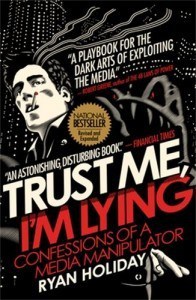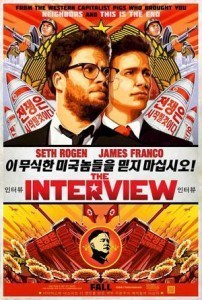What if Sony never was really hacked?
Or worse yet, if Sony hacked themselves?
I know this sounds a bit crazy–and I admit, I AM a bit crazy–but, indulge me for a few minutes of your time and perhaps I'll convince you that it just might be possible that the whole thing was staged for a very specific purpose…
Why would anyone want to give themselves bad publicity?
I mean isn't bad publicity… bad?
Well, no–not really.
Have you ever heard the phrase “there is no such thing as bad publicity?”
I definitely believe there is some truth to this statement. And I'm not alone.
Best-selling author, Ryan Holiday, wrote a book about this very subject called “Trust Me, I'm Lying: Confessions of a Media Manipulator.”
In this book, he basically, flat out details how he manipulated mainstream media to give the infamous and self-proclaimed asshole, Tucker Max, front page coverage on major media channels, all to promote his movie “I Hope They Serve Beer In Hell.”
In “Trust Me, I'm Lying,” Ryan details out how he single-handedly spurred up negative press and even protests by purposely defacing his own promotional advertisements for “I Hope They Serve Beer In Hell” and sending a fake news tip-off to smaller blogs that he knew larger media outlets got their stories from.
He also purposely staged protests and enraged feminist and other organizations to stir up controversy and even a boycott of the movie.
What did all this negative press do?
To put it bluntly: it sold the hell out of a really crappy movie and book of the same name.

Sure, it's not on the same scale as the Sony hack, but if a single guy trying to promote a small budget movie can generate and utilize this much negative publicity, what could someone with a real budget do?
How far would they go?
In the book, Ryan alludes to many, much larger scandals and a whole industry of media manipulation, all fueled by lies and negative publicity.
Perhaps the Sony hack was real, but there is no denying that this secret world of negative publicity and media manipulation does exist–and it gets results.
Has anyone ever faked being hacked before? As a publicity stunt?
Funny you should ask.
Why, yes–and not too long ago.
Do you like burritos? I know I do.
Well, there is a certain company that wants you to like their burritos enough that they were willing to lie to you, by pretending to be hacked, to get you to eat more of them.
Check out these tweets from Chipolte's Twitter account:
Hi sweetie, can you please pick up some lime, salt, and onions? twitter
— Chipotle (@ChipotleTweets) July 21, 2013
Mittens13 password leave — Chipotle (@ChipotleTweets) July 21, 2013
Sorry all. We had a little problem with our account. But everything is back on track now! – Joe
— Chipotle (@ChipotleTweets) July 21, 2013
Please return to your usual #chipotle love and thanks for your patience with us today. – Joe — Chipotle (@ChipotleTweets) July 21, 2013
Whoops? Did Chipotle's Twitter account just get hacked?
Nope, they were just pretending to be hacked in order to gain followers. They even admitted it.
But Sony's never done anything like this, right? WRONG!
Prior to the release of the Sony PlayStation Portable (PSP), Sony created a fake blog at www.alliwantforxmasisapsp.com.
On the blog, some guy apparently posted posts saying how good the PSP was and rapping about how he wanted one for Christmas.
Something didn't sit right with some of Sony's gaming audience, and when they checked out who the site was registered to, it turned out to be…
… you guessed it, a viral marketing agency. Specifically Zipatoni, who since changed their name.
That viral marketing attempt by Sony failed, but it proves that Sony was investing in viral marketing and some unscrupulous tactics, including outright lying.
So, I wouldn't put it past Sony to try to do something like this.
But, would they really have hacked themselves?
Would they really have leaked that much personal data, just to get a little media attention?
Well, let's be honest, they didn't just get a little media attention. Sony has been all over every major news channel for weeks at a time.
The crude movie about assassinating the North Korean dictator, Kim Jong-un, which would have probably bombed in theaters, is making headlines, being spread all over Facebook and Twitter and getting more publicity than Santa Clause this Christmas.
I mean, Sony even has the president of the United States, talking about them and the movie.
Oh, and what has happened in this strange turn of events?
Well, now it appears Sony is backpedaling and saying they will release “The Interview” after all. I guess they are no longer afraid of Kim Jong-un?
Convenient how that worked out.
But, still I know what you are thinking…
This still seems like some crazy conspiracy theory. I mean, Sony suffered a lot of negative consequences from this whole fiasco.
Their stock tanked.
Actual damaging memos and data were released to the public.
Social security numbers of their employees were handed out.
What I think actually happened
Here is what I think actually happened:
I don't think Sony intended for all this to go down.
This is just a theory, but I think this started out as a viral marketing campaign.
All speculation, mind you.
But, what if Sony hired some viral marketing agency that took things too far?
What if Sony was just trying to stir up a little bit of negative publicity for The Interview and make it look like North Korea had hacked them in retaliation for making a movie about killing Kim Jong-un?
But, what if something went bad–horribly bad?
What if that viral marketing company hired the wrong “hacker” to carry out the cyber attack, because they wanted to make it look real, and that hacker had plans of his own?
What if Sony only wanted to create a little negative press, but the whole thing exploded in their face and now they are trying to make the most of it while reducing the damage as much as possible?
And here's one more “what-if” I'll throw out there–the scariest one of all.
What if “The Interview” becomes the best-selling, straight-to-DVD movie ever?
What do you think?
If you're crazy and you think I'm crazy and you'd like to hear more of my crazy thoughts on a weekly basis, sign up for my weekly emails here.



